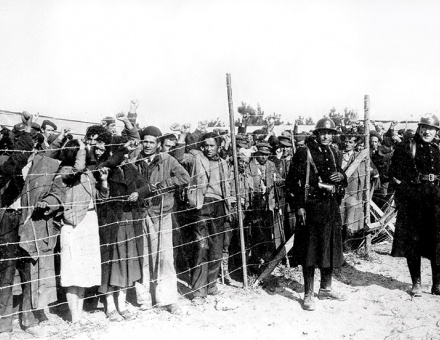22 August 1940: The Mexican lifeline
How to handle a refugee crisis, Mexican style
(translated and adapted from José M. Murià, “80 años de aquel acuerdo salvador” , Jornada, 22 August 2020)
The defeat in early 1939 of the legitimately constituted republican government in Spain resulted in almost half a million people crossing the French border in order to save their lives. The grand reception, as is known, was not always cordial, although it must be admitted that the French never expected so many refugees.
And, there were quite a few French who who sympathized with the Spanish fascists. “Nous somme de la part de Franco“, they often snapped at the peninsulares.
However, in France, there weren’t in immediate danger of losing their lives.
 It is well known that the Mexican government had provided immeasurable help from the very beginning of the refugee crisis, but the volume of the unfortunate was enormous. Several ships had already sailed to Mexico stuffed with refugees and many others, who could afford to do so, had fled on their own.
It is well known that the Mexican government had provided immeasurable help from the very beginning of the refugee crisis, but the volume of the unfortunate was enormous. Several ships had already sailed to Mexico stuffed with refugees and many others, who could afford to do so, had fled on their own.
Some of the Spaniards had managed to make new lives in France, while others were being encouraged to return home. In any case, there were still over 150,000 Spanish refugees in France by mid 1940, when the Germans invaded.
These refugees were in serious trouble. Francoist police were able to pursue them in France, and the Nazis began rounding them up for forced labor battalions.
With the instructions and blessing of President Lazaro Cardenas, the Mexican Ambassador, Luis I. Rodríguez obtained from Vichy puppet president, Philippe Petain, a commitment to sign a document that any foreign refugee — Spanish, Lebanese, Jews, even Germans and Italians seeking transit to Mexico would be under the protection of the neutral government of Mexico.

Luis I Rodriguez, about 1950
Negotiations between Rodríguez and the Vichy government lasted a month , being signed on 22, August 1940. It saved about 150,000 from either certain death, or, at the very least, transportation to the Nazi or Spanish concentration camps.
It is not a small thing! However, it was not smooth sailing. Many French authorities claimed to be ignorant of the agreement, requiring copies and more copies of required documents, or… at least something that sounded plausible to the French authorities. Over 80,000 certificates of transit were created one by one as the Mexican consulates had typists working around the clock.
It is worth noting that both the German and Italian governments endorsed the agreement… not out of kindness or out of fear of the Mexican military. More likely they needed our oil, which had only recently (and fortunately) been nationalized.
Although the wholesale deportations to Germany ended and some refugees already sent off to Germany were able to leave, the project was not a total success. However, there are few cases in human history of a rescue of this magnitude and quality. It is a shame that in today’s Spain, with so much nostalgia for the fascist regime, there is no formal recognition or homage to Mexico and its greatest president.






I did not know this history. Thank you for this post.
Would like to comment on your excellent piece about Spanish refugees but WordPress has an issue with that. Regrets
Write in LINDA SARSOUR on NOV. 3, 2020
RBC